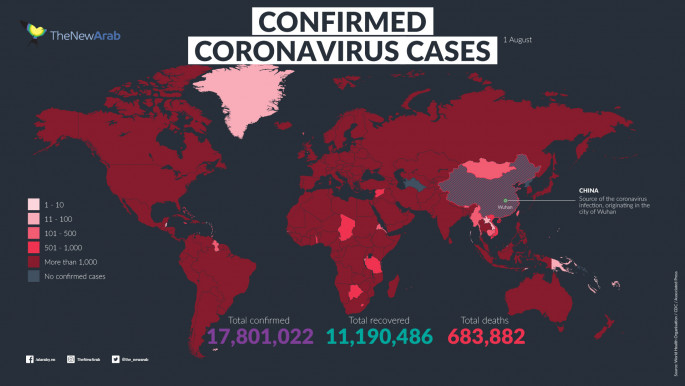Follow us on Facebook, Twitter and Instagram to stay connected
Turkey adds coronavirus to country's 'urgent situations' list as Istanbul readies for more cases
Turkey is struggling under the strain of growing coronavirus cases.
2 min read
This comes as coronavirus sweeps across the country [Getty]
Turkey has added pandemics to the list of the country’s urgent situations, the official gazette announced on Thursday, as the novel coronavirus continues to spread.
Immune plasma therapy, which uses the plasma of recovered Covid-19 patients to treat those who are infected, was also added to the Communique on Health Implications.
"Urgent situations" refers to circumstances that require medical intervention as soon as within 24 hours.
This comes after President Recep Tayyip Erdogan stepped up measures to stem the growth of coronavirus cases in Turkey, however, his repeated refusal to impose a full lockdown to keep the economy afloat is drawing criticism.
Gatherings are banned, there are obligations to wear masks almost everywhere, and restrictions have been placed on intercity trips, but Erdogan has fallen short of calling for complete confinement.
President Erdogan said on Monday two hospitals each with a 1,000 bed capacity, will be built in Istanbul - the epicentre of coronavirus cases in the country - to treat infected patients.
"We will complete them (the two hospitals) within 45 days and will open them to public service," Erdogan said in a televised speech.
|
One of the hospitals is due to be built in the area where the city's former international airport was located on the European side, and the other one-floor hospital at Sancaktepe on the Asian side of Istanbul.
Parliament began on Tuesday debating a government-sponsored bill to release up to a third of detainees in the country's overcrowded prisons as a safety measure against the coronavirus outbreak.With 34,109 cases and 725 deaths, according to official figures published on Tuesday, Turkey is the ninth country in the world most affected by the Covid-19 pandemic.
Experts are alarmed by the fast spread of the disease in Turkey, which reported its first official case in 11 March.
The number of cases is doubling every few days: From 7,400 on 28 March, it reached 15,000 on 1 April and exceeded 30,000 on Monday, according to official figures.
The government has taken nationwide measures, including shutting schools and cultural spaces and suspending flights with countries hit by the virus.
They have also ordered those over the age of 65 and under 20 to remain confined indoors, and quarantined dozens of towns and villages.
"Everyone absolutely has to stay at home, it must be made compulsory," a doctor who treats infected patients under intensive care at an Istanbul hospital told AFP on condition of anonymity.
"We are receiving more and more patients every day. We will soon reach the limits of our capacity."
 |





 Follow the Middle East's top stories in English at The New Arab on Google News
Follow the Middle East's top stories in English at The New Arab on Google News
![Israeli forces ordered bombed Gaza's Jabalia, ordering residents to leave [Getty]](/sites/default/files/styles/image_330x185/public/2176418030.jpeg?h=a5f2f23a&itok=_YGZaP1z)

